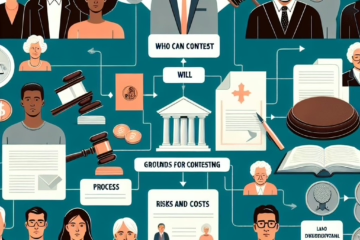Losing a loved one is never easy, and the process can become even more complicated if they pass away without leaving a will. If you find yourself as a potential beneficiary of someone who has died intestate (without a will) in British Columbia, you may have many questions about what to expect, especially if you’re unsure about the deceased’s assets or properties. This blog post will help clarify the process and provide guidance on how to navigate this situation.
Table of contents
What Happens When Someone Dies Without a Will in BC?
When a person passes away without a will in British Columbia, the Wills, Estates and Succession Act (WESA) governs how their estate will be distributed. The estate administration process becomes more rigid, as there are no instructions from the deceased on how to allocate their assets. Here’s an overview of how it works:
- Priority for Estate Administration
Someone must apply to the court to be appointed as the administrator of the estate. This is usually a close family member, such as a spouse, child, or sibling. If you are the next of kin, you may have the right to apply. If no one steps forward, the Public Guardian and Trustee of British Columbia may take on the role. - Distribution of Assets
The assets of the deceased are distributed according to a predefined hierarchy under WESA:- If there is a surviving spouse but no children, the spouse receives the entire estate.
- If there is a spouse and children, the spouse receives the first $300,000 (if the children are shared with the spouse) or $150,000 (if the children are from another relationship), and the remainder is split between the spouse and children.
- If there are no spouse or children, the estate is distributed among other family members, such as parents, siblings, nieces, or nephews, in descending order of priority.
- No Will, No Knowledge of Assets
If the deceased had multiple properties, bank accounts, or investments, identifying and valuing these assets becomes part of the administrator’s responsibilities. This may require considerable investigation, especially if the deceased did not leave clear records.
What Should You Do as a Beneficiary?
If you suspect that you are a beneficiary but lack information about the deceased’s properties or estate, follow these steps:
1. Confirm Your Eligibility as a Beneficiary
- Check your relationship to the deceased. WESA outlines the hierarchy of beneficiaries, so understanding where you fit in is essential.
2. Search for Relevant Documentation
- Gather any records or correspondence that might shed light on the deceased’s assets, such as bank statements, property tax bills, or investment accounts.
- If you have access to their residence, look for safes, file cabinets, or digital records.
3. Consult with a Lawyer
- A lawyer specializing in estate law can guide you through the legal process and help you protect your rights as a beneficiary. They can also assist in obtaining necessary court documents to initiate or join the estate administration process.
4. Apply for a Grant of Administration
- If no one has yet applied to administer the estate and you are entitled to do so, you may apply for a Grant of Administration from the court. This allows you to manage the estate’s assets and ensure they are distributed according to the law.
5. Investigate the Estate
- Once an administrator is appointed, they will inventory the deceased’s assets and debts. This might involve searching public records, contacting financial institutions, and working with appraisers or accountants.
Challenges You May Encounter
- Unknown Assets
Tracking down all the deceased’s assets can be time-consuming. If you suspect there are hidden properties or accounts, professional help, such as hiring a forensic accountant, may be necessary. - Disputes Among Beneficiaries
When multiple beneficiaries are involved, disagreements may arise about the distribution of assets. Mediation or legal intervention may be required. - Debts of the Deceased
The estate must first settle any outstanding debts before distributing assets. This could impact the final amount beneficiaries receive.
How a Lawyer Can Help
An experienced estate lawyer in British Columbia can:
- Determine your legal rights as a beneficiary.
- Assist with the estate administration process.
- Help locate and value the deceased’s assets.
- Resolve disputes with other beneficiaries or creditors.
- Ensure the estate is distributed according to the law.
Conclusion
Being named as a beneficiary of someone who has passed away without a will can feel overwhelming, especially if the deceased’s assets are unknown or complex. Understanding the legal process in British Columbia is essential for ensuring your rights are protected and the estate is handled properly. Seeking legal guidance early on can help make this process smoother and provide you with peace of mind during a challenging time.
If you’re in this situation, consider consulting with a lawyer to better understand your role and responsibilities. Having expert advice can make all the difference in navigating the complexities of estate administration.
FAQs: Beneficiary of Deceased Without a Will in BC
Can someone be excluded from inheriting? In intestacy, exclusions are based on the hierarchy set by WESA, not personal wishes.
What is intestate succession? Intestate succession is the process of distributing a deceased person’s estate when they pass away without a will.
Who is responsible for managing the estate if there is no will? A court-appointed administrator manages the estate if there is no will.
How is an estate distributed in BC if there is no will? The estate is distributed according to the Wills, Estates and Succession Act (WESA).
What is the Wills, Estates and Succession Act (WESA)? WESA is the law in British Columbia that governs how estates are distributed when there is no will.
Who can apply to be the administrator of an estate? Close family members, such as a spouse, child, or sibling, can apply to be the administrator.
What happens if no one applies to administer the estate? The Public Guardian and Trustee of British Columbia may take over the administration.
How is the surviving spouse’s share calculated? The spouse receives the first $300,000 if the children are shared or $150,000 if the children are from another relationship.
Can a beneficiary apply for administration? Yes, a beneficiary can apply to administer the estate if no closer relatives step forward.
How do I know if I am a beneficiary? Beneficiaries are determined based on the relationship to the deceased under the intestate laws.
What if the deceased has debts? The estate must pay off all debts before distributing the remaining assets to beneficiaries.
Can disputes arise among beneficiaries? Yes, disputes can arise, especially when beneficiaries disagree on the distribution of assets.
How can I locate the deceased’s assets? Search for financial records, property titles, and other documentation that may indicate the deceased’s assets.
Can I claim a share of the estate if I was financially dependent on the deceased? You may be eligible to claim support from the estate under WESA if you were financially dependent.
Do I need a lawyer to handle estate matters? While not mandatory, a lawyer can help navigate the complex legal processes involved.
What happens to joint assets? Jointly owned assets typically pass directly to the surviving owner outside of the estate.
Can stepchildren inherit under WESA? Stepchildren do not inherit under WESA unless they were legally adopted.
How long does the estate administration process take? The process can take several months to over a year, depending on the complexity of the estate.
Can a distant relative inherit if there are no close relatives? Yes, distant relatives can inherit if there are no closer eligible family members.
What happens if no relatives can be found? If no relatives can be found, the estate may escheat to the provincial government.
Do I need a grant of administration to access the estate’s assets? Yes, a grant of administration is usually required to manage and distribute the estate’s assets.
Can an administrator charge fees for their work? Yes, administrators are entitled to reasonable compensation for their work.
What is an intestate search? An intestate search involves looking for heirs and assets of the deceased.
What happens to the deceased’s pets? Pets are considered property and can be included in the estate distribution or rehomed.
Can life insurance proceeds be part of the estate? Life insurance proceeds are usually paid directly to the named beneficiary and are not part of the estate.
Are beneficiaries responsible for the deceased’s debts? No, beneficiaries are not personally responsible for the deceased’s debts; debts are paid from the estate.
Can a common-law partner inherit under WESA? Yes, a common-law partner may inherit if they meet the legal requirements for spousal status.
Do beneficiaries have to pay taxes on their inheritance? In Canada, there is no inheritance tax, but the estate may be subject to taxes before distribution.
Can a will be found after the estate is distributed? If a will is discovered later, it may alter the distribution of the estate.
How are minors’ inheritances handled? Inheritances for minors are held in trust until they reach the age of majority.
What if there are multiple administrators? Co-administrators must work together to manage the estate, and decisions typically require consensus.
Can I contest the administrator’s actions? Yes, you can challenge an administrator’s actions if they are not acting in the best interest of the estate.
How do I deal with international assets? Managing international assets may require legal assistance in the country where the assets are located.
Can I inherit if I live outside BC? Yes, you can inherit as long as you are eligible under WESA.
What happens if the estate has no assets? If the estate has no assets, there is nothing to distribute to beneficiaries.
What is probate? Probate is the legal process of validating a will or confirming an administrator’s authority.
Can creditors claim against the estate? Yes, creditors can make claims against the estate before it is distributed.
What is an estate inventory? An estate inventory is a detailed list of all assets and debts of the deceased.
Can I sell estate property without a grant of administration? No, you typically need a grant of administration to sell estate property.
How do I report fraud in estate administration? Fraud can be reported to the court or law enforcement.
What happens to digital assets? Digital assets are treated like other personal property and may require special access or permissions.
Can an estate be reopened? Yes, an estate can be reopened if new assets are discovered or legal issues arise.
What documents are needed to administer an estate? Common documents include death certificates, financial records, and court orders for administration.
What is the role of the Public Guardian and Trustee? The Public Guardian and Trustee can manage estates if no family member is available.
Can I renounce my inheritance? Yes, you can disclaim your inheritance if you do not wish to accept it.
Can I hire a professional administrator? Yes, professional estate administrators or trust companies can be hired to manage the estate.
What is the deadline to apply for administration? There is no specific deadline, but delays can complicate the process.
Discover more from Pax Law Corporation
Subscribe to get the latest posts sent to your email.



0 Comments